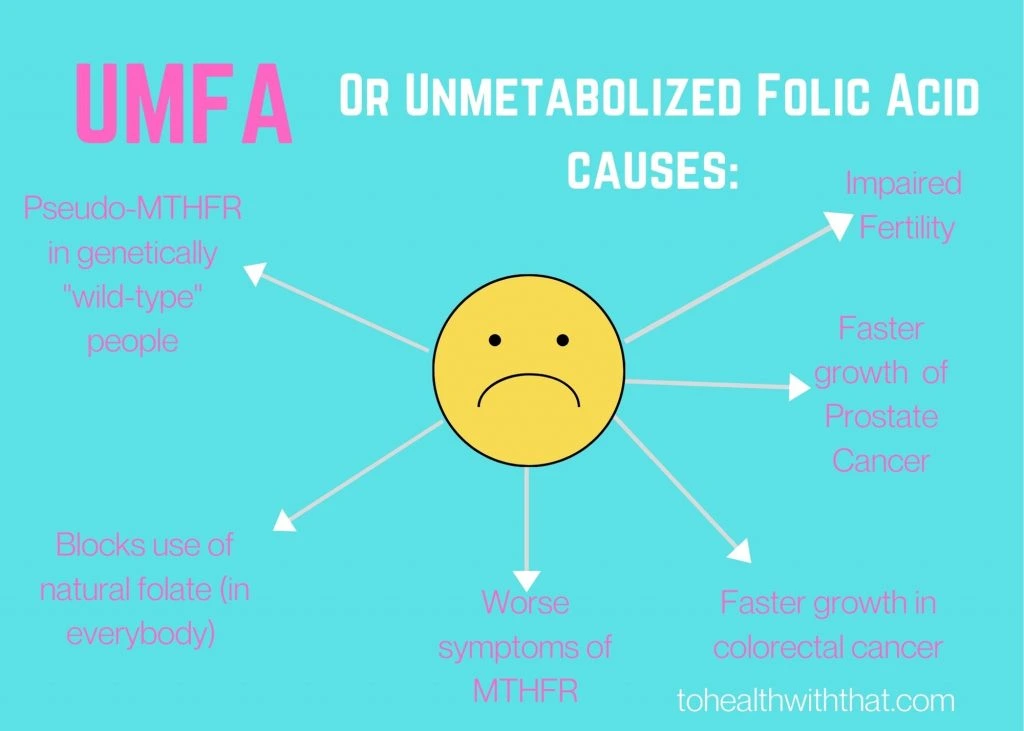This week I wanted to diverge on subjects a bit just because a very relevant question came up in the MTHFR community, This is such an important issue that I want to make sure it gets the attention it deserves.
One of our members in Genetic Rockstars is pregnant and her midwife is recommending 5000 mcg folic acid in spite of her MTHFR issue. This is a common question because 5000 mcg folic acid is standard practice in many fertility centers and medical offices for pregnancies that are considered in any way at risk.
Like everything else involving MTHFR, research is limited but I do want to deep dive into a couple of relevant studies.
The most important piece of research to take to your midwife or fertility practitioner is a study published in the Journal of Assisted Reproduction and Genetics in 2018.
This study followed 33 couples in which one or both of the partners had an MTHR polymorphism who had fertility problems lasting at least 4 years. This could include recurrent fetal loss, premature ovarian failure, or abnormal sperm parameters – so bear in mind this could be the mother or the father who has MTHFR issues. Two-thirds of these couples had previously failed assisted reproductive technology attempts.
Most of the women in this study had been previously treated, unsuccessfully, with 5000 mcg (or 5 mg) folic acid.

The couples in this study were given 600 mcg 5-LMTH, which is the active form of folate, for four months before attempting conception or starting another round of assisted fertility treatment. This four-month period was chosen to allow for a complete cycle of spermatogenesis, which is approximately 74 days.
The results of this one simple intervention were, in my opinion, absolutely astounding. Of the 33 couples:
- 2 were still in treatment at the date of reporting.
- 13 couples conceived spontaneously (this is after four years of unsuccessful reproductive attempts)
- 14 achieved successful pregnancies using ART (assisted reproductive technology). ART typically refers to IVF or in-vitro fertilization.
- 3 couples did not achieve successful pregnancies.
- 1 couple failed to report back.
I am going to read the conclusion of this research article verbatim because frankly, I couldn’t sum it up better.
“The conventional use of large doses of folic acid (5 mg/day) has become obsolete. Regular doses of folic acid (100–200 μg) can be tolerated in the general population but should be abandoned in the presence of MTHFR mutations, as the biochemical/genetic background of the patient precludes a correct supply of 5-MTHF, the active compound. A physiological dose of 5-MTHF (800 μg) bypasses the MTHFR block and is suggested to be an effective treatment for these couples. Moreover, it avoids potential adverse effects of the UMFA syndrome, which is suspected of causing immune dysfunction and other adverse pathological effects such as cancer (especially colorectal and prostate).”
Servy EJ, Jacquesson-Fournols L, Cohen M, Menezo YJR. MTHFR isoform carriers. 5-MTHF (5-methyl tetrahydrofolate) vs folic acid: a key to pregnancy outcome: a case series. J Assist Reprod Genet. 2018;35(8):1431-1435. doi:10.1007/s10815-018-1225-2
The most startling result of this research, I feel, is the tremendous number of couples who conceived spontaneously after a simple few-month intervention with 5-LMTHF. Imagine the amount of heartache, expense, and medical intervention that could be avoided if 5-LMTHF became the standard of care?

The other issue considered here is something called Unmetabolized Folic Acid Syndrome, which has been demonstrated in “wild type” people to cause pseudo-MTHFR. In pseudo-MTHFR, people who have fully functioning MTHFR enzymes have both high levels of unmetabolized folic acid and high levels of homocysteine in their blood. In people with an MTHFR deficiency, UMFA blocks the entry of folates into the folate cycle and further impairs the capacity of their already struggling MTHFR enzymes.
Unmetabolized Folic Acid has also been implicated in promoting colorectal and prostate cancer. And folic acid itself shows poor clinical success and in some cases, it tests worse than placebo in reducing homocysteine levels or downstream measures of cardiac health.
Next week I’d like to talk about some of the issues that have been linked to high levels of unmetabolized folic acid in pregnant mothers and the problems that travel downstream to those unborn children. If you haven’t done so already, please sign up to the email list on tohealthwiththat.com, or join the MTHFR community Genetic Rockstars at community.tohealthwiththat.com. I have big plans this year for courses and I want you to be the first to know.
MTHFR is a common genetic mutation that can contribute to anxiety, depression, fatigue, chronic pain, infertility, and more serious conditions like breast implant illness, heart attack, stroke, chronic fatigue syndrome, and some types of cancer. If you know or suspect you have an MTHFR variant, schedule a free 15-minute meet-and-greet appointment with MTHFR expert Dr. Amy today.
Book Your Appointment

My husband and I sound exactly like the people in the study. 5 years of infertility, failed IVF rounds, 1 miscarriage. I have the MTHFR mutation but my husband does not. Is it beneficial for him to be on a folate supplement regardless?
Hi Jennifer,
Having your husband take the methylfolate vs. a regular folate is kind of no-risk, so I would switch him over to a good multivitamin. Also – season three of the podcast will be all about subfertility and fertility prep so be sure to tune in! Keep me posted on how the methylfolate does for you and I wish you all the best on your baby journey. 🙂